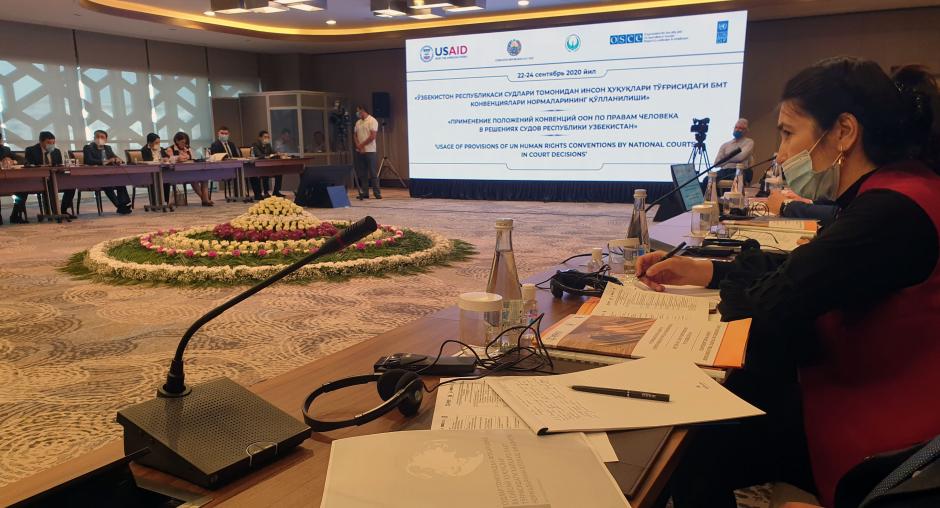OSCE Project Co-ordinator in Uzbekistan co-organizes seminar for judges on using provisions of international treaties in national court decisions

Judges and members of Uzbekistan’s Supreme Court and the National Human Rights Centre completed a three-day seminar on 24 September 2020 about using the provisions of international treaties in decisions of the country’s courts.
Some 69 participants, including 13 women, took part in the seminar, which was conducted in a blended format. The OSCE Project Co-ordinator in Uzbekistan, in co-operation with the Supreme Court, the National Human Rights Centre, the United Nations Development Programme’s (UNDP) Rule of Law Partnership in Uzbekistan Project, and the United States Agency for International Development organized the seminar.
Kozimzhon Kamilov, Chairperson of the Supreme Court; Daniel Rosenblum, U.S. Ambassador to Uzbekistan; Professor Akmal Saidov, Director of the National Human Rights Centre; Matilda Dimovska, Resident Representative of UNDP in Uzbekistan; and Ambassador John MacGregor, the OSCE Project Co-ordinator in Uzbekistan welcomed the participants. In their remarks, they highlighted the country’s reforms in the fields of the rule of law, independence of the judiciary and the administration of justice.
The OSCE Project Co-ordinator noted that there are numerous relevant OSCE commitments and reminded the judges of the need for a strong independent judiciary, observing that much progress is being made in that direction. “Viewed from the prism of the OSCE’s comprehensive approach to security, the benefits to the people of Uzbekistan comes from not only a greater attention to their human rights, but the strengthened economic security accruing from stronger rule of law,” he said.
During the seminar, two international experts, George Tugushi (Georgia) and Alexander Vashkevich (Belarus), discussed the international standards in delivering justice. They pointed to other countries’ experiences in implementing provisions of the International Covenant on Civil and Political Rights (ICCPR), the Convention against Torture and Other Cruel, Inhuman or Degrading Treatment or Punishment (CAT), and the Convention on the Elimination of All Forms of Discrimination against Women (CEDAW) in national court decisions. Participants also worked on case studies related to peaceful assembly, extradition and gender-based discrimination.
The participating judges are from Tashkent city and the regions of Tashkent and Sirdaryo who are working on administrative, criminal and civil cases, as part of a project to support judicial and legal reforms in the country. The OSCE Project Co-ordinator and the Supreme Court are implementing this project. This seminar is planned to be held in other regions of Uzbekistan in the coming months.
